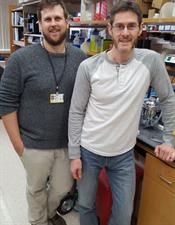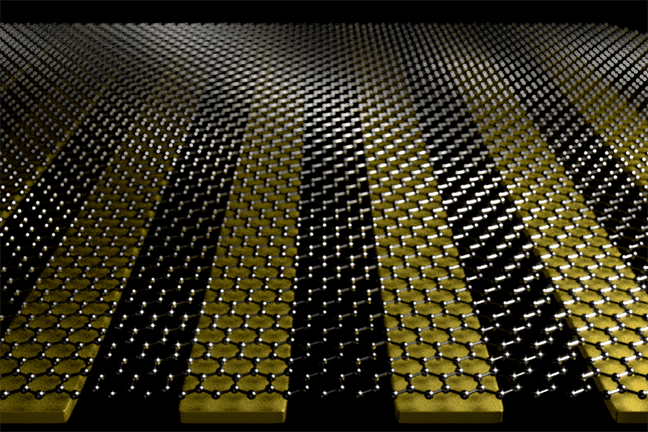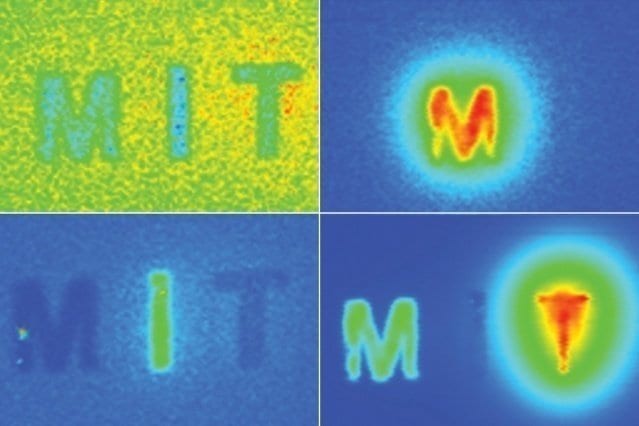
Wilmot Cancer Institute research team reports that combining a type of radiation therapy with immunotherapy not only cures pancreatic cancer in mice, but appears to reprogram the immune system to create an “immune memory” in the same way that a vaccine keeps the flu away.
The result is that the combination treatment also destroyed pancreatic cells that had spread to the liver, a common site for metastatic disease.
The journal Cell Reports published the study, with Scott Gerber, Ph.D., as corresponding author, and Bradley Mills, Ph.D., a post-doctoral fellow in the Gerber Lab, as first author. They led a large team of collaborators from the University of Rochester departments of Surgery, Microbiology and Immunology, Pathology and Laboratory Medicine, Radiation Oncology, and Environmental Medicine.
Pancreatic cancer is aggressive and generally has poor survival odds. It’s been in the news this year after “Jeopardy!” host Alex Trebek went public with his diagnosis and treatment. In more than 80 percent of patients, the cancer is discovered in later stages when surgery is not an option and chemotherapy is usually not effective beyond stabilizing the disease.
Pancreatic tumors are notoriously hard to treat because they are surrounded by a toxic stew of proteins and other tissues that protect the cancer cells from the immune system’s natural role to attack invaders.
Wilmot researchers looked for an innovative treatment combination that could do two things at once: activate T-cells to attack the cancer and convert the immune-suppressing cells into fighters, the study said.
The combination they used in laboratory models consisted of stereotactic body radiotherapy (SBRT), which delivers high doses of radiation over a short period of time and may also prime the immune system to kill cancer cells; and interleukin-12 (IL-12), which has well-known anti-cancer activity and also activates the immune system. However, IL-12 often comes with harsh side effects. To solve that problem, researchers are testing a timed-release technology in a specially designed mouse model for pancreatic cancer, which would slowly deliver the drug over two weeks.
The preclinical laboratory investigation resulted in Gerber’s team receiving a $2 million National Cancer Institute grant in July to continue the research, which includes moving the findings into clinical trials in the future. Gerber is an assistant professor and co-director of the Center for Tumor Immunology Research.
Learn more: Study: Innovative Pancreatic Cancer Treatment May Rev Up Immune System
The Latest on: Pancreatic cancer treatment
[google_news title=”” keyword=”pancreatic cancer treatment” num_posts=”10″ blurb_length=”0″ show_thumb=”left”]
via Google News
The Latest on: Pancreatic cancer treatment
- With prayers and smiles, comedian Tracy Morgan visits cancer patients at Staten Island University Hospitalon May 1, 2024 at 7:48 am
The entertainer spent time visiting with those of all ages in the medical facility's new Florina Cancer Center.
- Researchers find difference in pancreatic cancer cells, offering new hope for immunotherapy effectivenesson May 1, 2024 at 6:32 am
A new study has found that pancreatic cancer cells are different based on their location in the pancreas, providing new information about tumors that could lead to better targeted treatments.
- Local business owner battling cancer takes part in fundraising walkon May 1, 2024 at 2:31 am
In the midst of his own battle against pancreatic cancer, local business owner Kevin Riley traveled to Boston on Saturday where he and thousands of others walked three ...
- Pancreatic Cancer: Successful Trial Against Pancreatic Cancer with Defence Therapeutics' ARM-002 Anti-Cancer Vaccineon May 1, 2024 at 12:15 am
Defence Therapeutics Inc. (CSE: DTC) (OTCQB: DTCFF) (FSE: DTC), ("Defence" or the "Company"), a Canadian biopharmaceutical company developing novel immune-oncology therapeutics and drug delivery ...
- Study highlights differences in pancreatic cancer cells based on locationon April 30, 2024 at 9:47 pm
A new study has found that pancreatic cancer cells are different based on their location in the pancreas, providing new information about tumors that could lead to better targeted treatments.
- Sussex woman reflects on her dad’s diagnosis of terminal pancreatic canceron April 30, 2024 at 8:35 am
Clarisse Honore’s dad, Gilbert, was diagnosed with pancreatic cancer in October 2021. He sadly died in April 2023. Clarisse is working with Pancreatic Cancer Action, the only UK-based charity ...
- Pancreatic cancer fundraising event canceled amid protests on Auraria Campuson April 27, 2024 at 8:52 pm
DENVER — The Pancreatic Cancer Action Network (PanCAN) announced the cancellation of PurpleStride Colorado, their annual 5K walk/run fundraising event, due to ongoing protests at the Auraria Campus, ...
- “Star Trek ”Actress Kitty Swink Had a 4% Survival Rate After Pancreatic Cancer — It's Been 20 Years (Exclusive)on April 25, 2024 at 8:44 am
"Seventeen days later, I came out of Cedars-Sinai with half my stomach, half my pancreas, my gallbladder gone, two feet of my intestines removed out, 28 lymph nodes removed and a 4% chance of ...
- New findings on pancreatic anatomy may affect diabetes research and treatmenton April 22, 2024 at 7:54 am
Researchers at Umeå University have succeeded in imaging an entire human organ, a pancreas, in microscopic resolution. By staining different cell-types with antibodies and then using optical 3D ...
- What Is Pancreatic Cancer?on April 22, 2024 at 5:30 am
Pancreatic cancer develops when abnormal cells in the pancreas grow uncontrollably, causing symptoms like fatigue, jaundice, and urinary changes.
via Bing News









